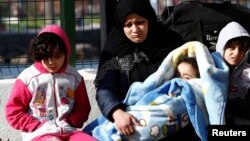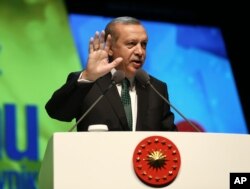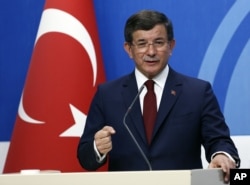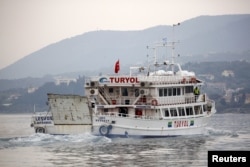Senior European Union and Turkish officials are meeting to rescue the EU visa deal. Since the ousting of Turkish Prime Minister Ahmet Davutoglu by President Recep Tayyip Erdogan, the deal has started to unravel, with increasingly harsh rhetoric from both sides.
An international students' meeting Sunday was the latest venue for Turkish President Recep Tayyip Erdogan to slam Brussels, declaring Turkey has received three million refugees, while the European Union has just looked on.
Friday, he said the European Union cares more about dogs and gay rights than the plight of Syrian refugees.
The relentless rhetoric comes as the European Union insists Turkey harmonize its anti-terror laws in order to secure visa free travel to European countries.
Visa free travel, a long time wish of Turkey’s AKP government, was promised by Brussels in exchange for Turkey taking back migrants who entered Europe from its territory. The agreement heralded as a new chapter in Turkish-EU relations is in deep trouble says political consultant Atilla Yesilada of Global Source partners.
"The drive to reintegrate with the EU is over. He [Erdogan] is not going to amend the anti-terror law to get the visa waiver. In fact, we may anticipate a crisis, because one of the leading members of the AKP, Burhan Kuzu, said we should send all the Syrian refugees to Europe. So I anticipate a crisis with Europe," said Yesilada.
One pro-government Turkish newspaper told migrants to "get your suitcases ready."
Erdogan insists rather than curtailing the anti-terror laws they need to be expanded with Turkey facing twin terror threats of Kurdish rebels and Islamic State.
But Political columnist Kadri Gursel of Cumhuriyet newspaper and Al-Monitor website, said the EU deal is a victim of tensions between the president and his former prime minister Ahmet Davutoglu.
"They [EU] did their best to offer Davutoglu a success story in the deal with this refugee crisis. And now as Erdogan does not like any success scored by others than himself, he is now trying to kill it in a political legitimate way," said Gursel.
Erdogan ousted his prime minister earlier this month and Davutoglu is to be replaced by an AKP party congress this month.
Observers say EU officials' praise of Davutoglu while criticizing Erdogan only further irked the Turkish president, sealing the prime minister’s fate. Pro-president newspaper columnists have been attacking the migrant deal and accusing the European Union of tricking Davutoglu.
EU officials are trying hard to resolve the impasse. Since the migrant deal was agreed to there has been a 90 percent drop in migrants entering Greece from Turkey.
Leverage on migrant issue
Analysts said Erdogan believes the leverage on the migrant issue means he can dictate terms. But consultant Yesilada warns that leverage maybe short-lived,
"The Europeans, even though this is denied by the German Foreign Ministry, are planning to intern Syrian refugees on the Greek islands and then process them there. They are going to reroute the six billion euro [$6.7 billion] aid to Greece, and we are going to see another freeze on accession talks and probably we are going to see Europe coming down very hard on human rights abuses and Turkey slowly mutating into a pariah in the Western world," said Yesilada.
German Chancellor Angela Merkel, one of the architects of the migrant deal and its main supporter, is expected to meet with her Turkish counterpart while attending next week’s U.N. Humanitarian summit in Istanbul. Observers say the meeting could offer the last chance to save the migrant deal, an agreement critics are increasingly accusing Brussels of sacrificing its human rights principles for.







